Menu

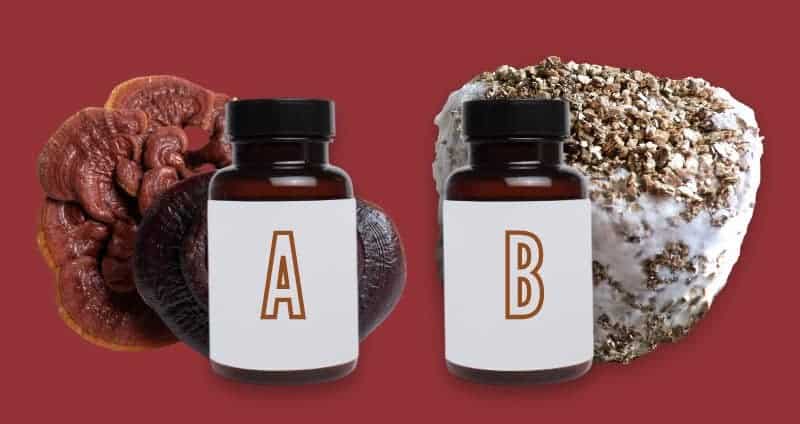
Reishi (Ganoderma sessile), also known as the "mushroom of immortality" or "herb of spiritual potency," is a functional mushroom from the Ganoderma species revered for its scarcity and unique health benefits. In nature, there are no toxic reishi species lookalikes, but on the market, there are indeed supplements that can be confused as being made from real reishi when they’re not.
Unfortunately, a recent study conducted by the US Pharmacopeia (USP) and Nature found that only 26% of reishi mushrooms as supplements on the market today contain the bioactive components unique to reishi [1]. This means it's easy to purchase low-quality reishi mushrooms inadvertently.
Harvesting reishi mushrooms can be challenging due to their scarcity, and they are expensive to cultivate. Therefore, many manufacturers use reishi mycelium (the root structure of mushrooms), or other types of mushrooms altogether in their reishi supplement lookalikes.
Today, we want to help you identify authentic Ganoderma sessile or reishi mushrooms from diluted or fake lookalikes to ensure proper reishi mushroom identification.
Reishi mushrooms have numerous health benefits. They can:
When foraging reishi mushrooms, it’s essential to ensure that they have matured properly to capture their full range of benefits. Reishi species is the “King of Mushrooms” because of its wide applications in health maintenance and its complex of unique compounds.
Key to reishi’s power as a natural health booster is its beta-glucans and triterpenes. These compounds become key indicators of the quality of the supplement you are considering buying, as we will discuss below.
The following list of 4 characteristics will help you identify a true, quality reishi supplement from weak or fake lookalikes.
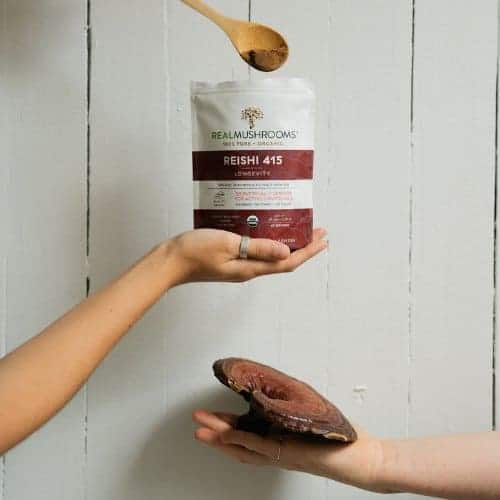
Although reishi mushrooms grow with a subtly sweet aroma reminiscent of cocoa, they have a strong earthy, bitter taste.
The bitter taste is a quality indicator that signifies the availability of beneficial polysaccharides called triterpenes. Therefore, you can leverage this to tell whether your supplements are authentic.
Triterpenes, specifically ganoderic acids, are behind the bitter flavor of reishi. Reishi mushrooms mature fully in nature with these beneficial compounds intact. Hemlock reishi is known to have a particularly bitter taste, which is why it’s highly valued. Reishi is the only source of ganoderic acids. These acids are active polysaccharides with a molecular structure similar to steroid hormones [2].
The absence of the bitter flavor in your supplements means you’ll miss out on the following benefits offered by triterpenoids:
When purchasing reishi mushrooms as supplements, whether in powder or extract form, check the product label for an analysis of the amount of triterpenoids in the product.
Expert Tip: The potency of reishi supplements is partly based on the level of triterpenoids, which you can determine simply by tasting. The more bitter your reishi tea or capsule, the higher the quality and levels of beneficial triterpenoids.
Beta-d-glucans are the primary source of health benefits in functional mushrooms. They are long chains of sugar molecules that compose the cell walls of mushrooms, and they activate innate and adaptive immunity.
Beta-d-glucans are at the top of the list of active beneficial compounds in mushroom extracts, as they help to support immune defense.
The product label must indicate the percentage of beta-d-glucans. This data is necessary because the levels of beta-d-glucans in mushroom products suggest its potency.
If a reishi mushroom extract lacks beta-d-glucans, you can best believe that it also lacks other compounds, such as amino acids, vitamins, and minerals, which are typically not measured.
At Real Mushrooms, we offer high-quality mushroom extracts from 100% pure organic mushrooms produced without any grain, fillers, or additives. Our reishi mushroom supplements provide you with all the benefits of the “mushroom of immortality” and have the individual beta-d-glucan content indicated on the product labels.
The following table highlights all our reishi supplements and reishi mushroom blends, the percentage of beta-d-glucans in each, and the amounts of other beneficial active compounds.
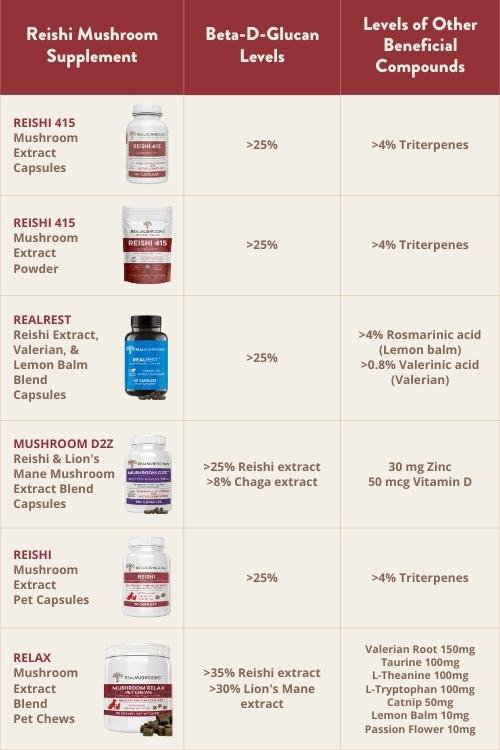
Unlike most supplement manufacturers, we boldly list the active compounds and ingredients in our mushroom extract products.
Extracts made from the mushroom (fruiting body), as opposed to the mycelium (root structure), will have high levels of beta-d-glucans.
Mycelium-based supplements have very high levels of alpha-glucans (filler starches like glycogen cellulose) and low levels of beta-d-glucans.
Therefore, you need to ensure the product indicates that the reishi mushrooms (fruiting body) are used and not mycelium if you want to enjoy all the health benefits of this fungus.
Since 1976, the American Food and Drug Administration has a regulation regarding mycelium products:
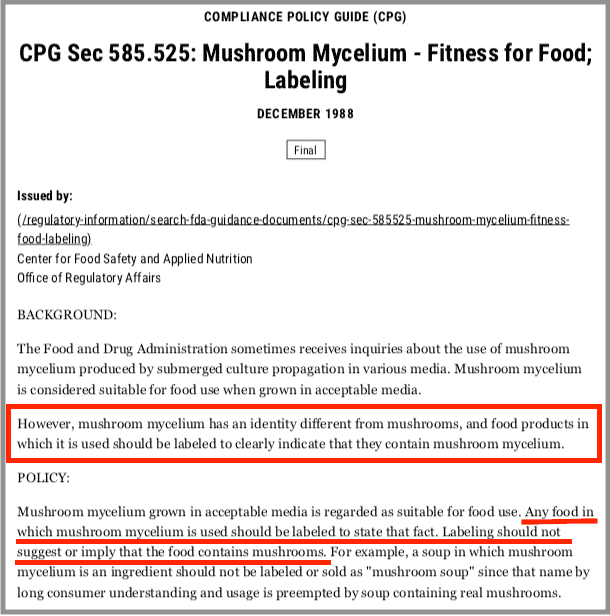
Mycelium-based products are reishi mushroom lookalikes with misleading marketing. Always look at the product ingredient label and make sure that it is explicit about whether the extract contains chopped reishi mushrooms (sometimes labeled as “fruiting body”) or reishi mycelium.

Unbeknownst to many supplement consumers, polysaccharide content is not an indicator of quality in mushroom extracts. In fact, it can indicate a poor-quality mushroom product.
Polysaccharides can include both alpha-glucans and beta-glucans. Beta-glucans are the desirable health-supporting polysaccharides in reishi mushrooms. Whereas, alpha-glucans are polysaccharides that derive from starches.
It’s not uncommon to find supplements boasting high polysaccharide content. However, in truth, they feature low beta-d-glucans and high levels of alpha-glucans.
Such supplements are posing as reishi mushrooms, but they are just myceliated grain pumped with useless starches. Fillers from myceliated grain dilute the active compounds in your mushroom product.
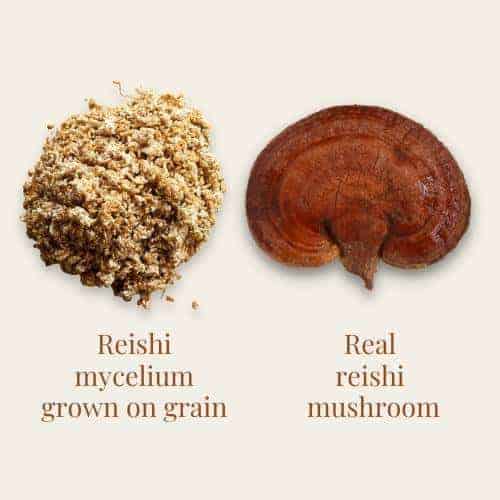
So, what should be measured instead of total polysaccharide content? The beta-d-glucan percentage shows the amount of beneficial fungal compounds in the extracts.
Buyer Tip: Many reishi mushroom lookalikes say “mushroom extract” or “mushroom supplement” on the label. However, they will actually only contain mycelium grown on grain and no mushrooms at all. These products will often boast a high polysaccharide content without indicating true beta-glucan content. So, make sure the beta-glucan and triterpenoid levels are listed on the product label.
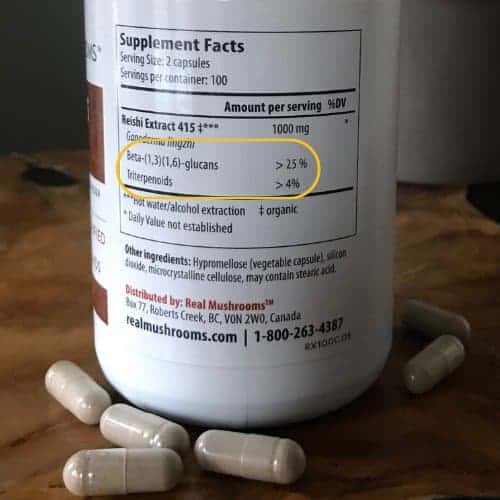
A third party should evaluate reishi mushroom supplements for authenticity, sourcing, and potency. These evaluations determine whether the supplements are extracted from high-quality, health-promoting reishi mushrooms in their purest form.
Third-party labs need to ascertain the potency based on the levels of beta-d-glucans in the product and the ingredients used (true reishi instead of other types of mushrooms).
For instance, Real Mushrooms’ Organic Reishi 415 Mushroom Capsules were evaluated by ConsumerLab alongside 6 other reishi supplements. Believe it or not, Real Mushrooms’ Reishi extract came in first place thanks to the high amounts of beta-d-glucan and ganoderic acid concentration, high purity levels, and exclusive mushroom (fruiting body) content.
In addition, our supplements:
It’s time to end your search for the best reishi mushrooms. Real Mushrooms has exactly what you need to help you support your immune system, longevity, sleep, and state of mind: Organic Reishi Mushroom Capsules and 100% Organic Reishi Mushroom Powder.
Like many of our other clients, you’ll love our supplements for their wholesome benefits that are obtained from 100% real mushrooms sourced from organic farms in China. This means the foundation of our supplements is as sustainable as nature intended.
“I started using reishi as a form of health maintenance ... I have been using Real Mushrooms’ reishi for 5 years now. Real Mushrooms reishi is what I buy because I feel theirs is the most potent.” - Paul
“I take the reishi capsules every evening, a couple of hours before going to bed. I have found that it helps me wind down and makes it easier to fall and stay asleep.” - Jon
Not only can you trust Real Mushrooms reishi products for your own health, but your pets’ health also!
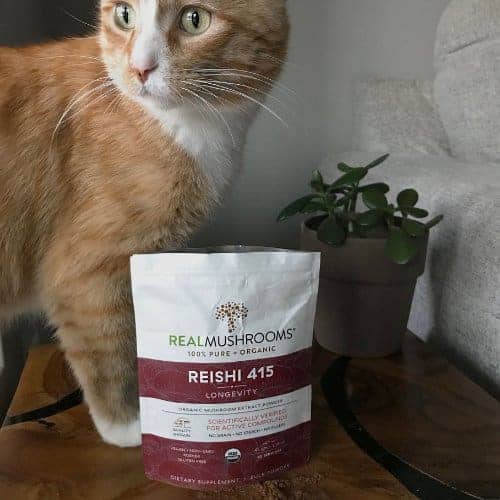

Disclaimer: The information or products mentioned in this article are provided as information resources only, and are not to be used or relied on to diagnose, treat, cure, or prevent any disease. This information does not create any patient-doctor relationship, and should not be used as a substitute for professional diagnosis and treatment. The information is intended for health care professionals only. The statements made in this article have not been evaluated by the Food and Drug Administration. Any products mentioned are not intended to diagnose, treat, cure, or prevent any disease. The information in this article is intended for educational purposes. The information is not intended to replace medical advice offered by licensed medical physicians. Please consult your doctor or health practitioner for any medical advice.